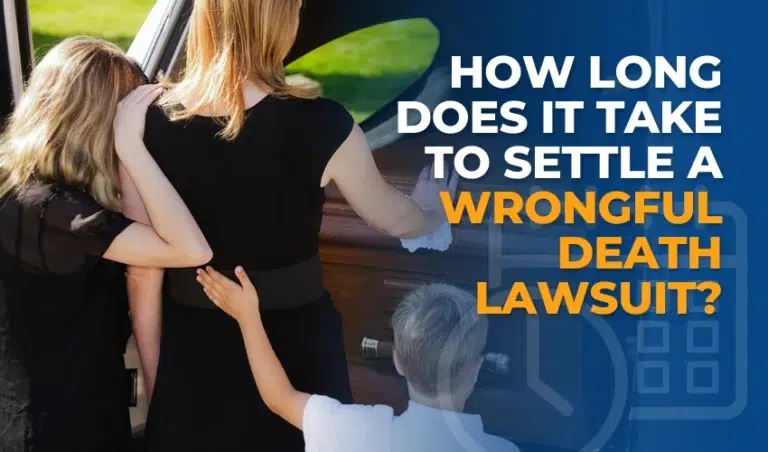Losing a loved one is devastating. When that loss is caused by someone else’s negligence or wrongdoing, the pain is compounded by a deep sense of injustice. If you’re considering a wrongful death lawsuit, one of the first questions you may have is how long it will take to reach a resolution. While every case is different, understanding the process and factors that influence the timeline can help you prepare for what lies ahead.
What Steps Are Involved in a Wrongful Death Lawsuit?
A wrongful death lawsuit is a civil claim brought by the family or legal representatives of someone who has passed away due to another party’s negligence. Fortunately, you do not have to handle this challenging process alone. Your attorney takes the lead at every step so that the legal burden does not fall entirely on your shoulders. The process begins with your attorney filing the lawsuit. This involves identifying the appropriate party or parties to hold accountable, such as an individual, business, or other entity. Your attorney will also conduct the substantial investigation necessary to establish liability and gather critical evidence, allowing you to focus on healing and supporting your family during this difficult time.
Once the claim is filed, your attorney manages the discovery phase, during which evidence is exchanged, witnesses are deposed, and experts are consulted. This phase can take several months or longer, depending on the complexity of the case. For example, cases involving defective products or unsafe conditions often require in-depth analysis, which your attorney coordinates to build a strong case.
After discovery, many cases move into negotiations. Settlements are common in wrongful death lawsuits, as both parties often prefer to avoid the time and expense of a trial. Your attorney will advocate for a fair resolution during these discussions. If negotiations fail, the case may proceed to court. In litigation, your attorney handles hearings, files motions, and prepares for trial, where evidence is presented and a verdict is reached. While litigation adds time to the process, you can rest assured that your attorney will guide you through each step with clarity and support.
What Factors Influence How Long a Case Takes?
Several key factors influence how long a wrongful death lawsuit may take to resolve:
- Case Complexity: The more complex the case, the longer it is likely to take. Cases with multiple defendants or disputed liability often require extensive investigation and legal proceedings to resolve. Additionally, situations involving intricate legal or technical questions—such as defective products—may require expert analysis, which extends the timeline.
- Evidence Availability: The availability of critical evidence, such as medical records, police reports, or witness testimony, can significantly impact the pace of the case. Delays in obtaining these materials or scheduling witness depositions can slow down the process.
- Negotiations with Insurance Companies: The timeline may also depend on how quickly and fairly the insurance company is willing to negotiate. Some insurers prolong settlement discussions to minimize their payouts, which can lead to delays if an agreement cannot be reached promptly.
- Court Backlogs: If the case goes to trial, external factors like court schedules and backlogs may add additional time. In some jurisdictions, high caseloads can result in long wait times for hearings or trial dates.
How Long Does a Typical Wrongful Death Lawsuit Take?
While it’s impossible to predict the exact length of time a wrongful death lawsuit will take, understanding general timeframes can help set realistic expectations. Cases that settle out of court often resolve more quickly, usually within six months to a year. These cases are typically resolved during negotiations when both parties agree on a fair settlement amount.
On the other hand, cases that proceed to trial can take significantly longer. Trials involve numerous steps, including pre-trial motions, jury selection, and the presentation of evidence in court, all of which can take years to complete. The timeline is further influenced by factors such as the defendant’s willingness to accept responsibility and the complexity of the damages being sought.
It is important to note that no two cases are the same, and the time it takes to resolve a lawsuit can vary widely based on the unique circumstances of each situation. However, understanding these general timelines can help you better prepare for the process ahead.
What Should You Do While Waiting for a Resolution?
A wrongful death lawsuit can be a lengthy and emotionally taxing process. While the legal proceedings unfold, focusing on personal well-being and staying proactive can make the waiting period more manageable. There are two key areas to concentrate on:
- Self-Care and Emotional Support: Grieving the loss of a loved one is deeply personal, and it’s essential to allow yourself space to heal. Connecting with friends, family, or professional counselors can provide much-needed comfort and understanding. Taking care of your physical and emotional health during this time will help you stay resilient.
- Organization and Communication: Staying organized by keeping track of all documents, correspondence, and updates related to the case can help streamline the process. Open communication with your attorney ensures that you remain informed and confident that your case is progressing as it should.

Why Does the Process Take So Long?
The legal system prioritizes thoroughness and fairness, which can sometimes make the process feel slow. In wrongful death cases, every detail matters. Building a strong case requires careful investigation, gathering of evidence, and consultation with experts, all of which take time to ensure a fair resolution.
Negotiations with insurance companies can also be a lengthy process. Insurers often seek to minimize their payouts, leading to prolonged discussions over the settlement amount. While this can be frustrating, it’s important to remain patient to avoid accepting an offer that does not fully address your loss. If the case goes to trial, additional delays are common. Court schedules, procedural requirements, and the need for thorough preparation all contribute to the length of the litigation process. While these delays can feel challenging, the ultimate goal is to achieve a resolution that reflects the significance of your loss and the accountability of the responsible party.
Can You Do Anything to Expedite the Process?
While some factors influencing the timeline of a wrongful death lawsuit are beyond your control, there are proactive steps you can take to help the process move more smoothly. Providing your attorney with all relevant information and documentation as quickly as possible can help avoid unnecessary delays. Staying responsive and maintaining open communication with your legal team ensures that the case progresses efficiently.
Additionally, relying on your attorney’s guidance can help you navigate potential roadblocks. Legal professionals understand the intricacies of the process and work proactively to address challenges as they arise. By collaborating closely with your attorney and focusing on the aspects of the case you can control, you’re contributing to a more efficient resolution overall.
What Should You Take Away From This?
A wrongful death lawsuit is not only a legal process but also an emotional one. While it’s natural to want closure and justice as quickly as possible, understanding the complexities and potential timeline of these cases can help you approach the process with patience and resilience. Whether your case is resolved through a settlement or goes to trial, the time invested is ultimately about seeking accountability and ensuring that your loved one’s loss is recognized.








